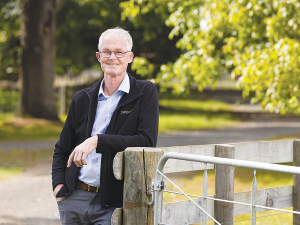DairyNZ Levy Vote Underway as Chair Highlights Seven-Fold Return
Voting has started for the renewal of DairyNZ's milksolids levy.
 DairyNZ chair Jim van der Poel says they want ETS legislation changed to take that pressure off farmers.
DairyNZ chair Jim van der Poel says they want ETS legislation changed to take that pressure off farmers.
DairyNZ chair Jim van der Poel says they are waiting patiently for the new government to be formed so they can discuss with them key issues of particular concern to the dairy industry.
He says one of these is the Emission Trading Scheme (ETS), which is saying that agriculture will be a part of this scheme come 1 January 2025. Van der Poel says they want this legislation changed to take that pressure off farmers and so DairyNZ can work constructively on what NZ contribution will look like.
“We are keen to have a constructive discussion with the new government on that,” he says.
Van der Poel says his organisation wants a change to the immigration settings which don’t work well for the dairy sector. He says the present freshwater reforms are also a big problem and says a lot of pressure is on regional councils to get these done by the end of next year.
“Already we can see that councils are under so much pressure from a timeline point of view, and this is an issue.
“There is the potential risk that in their haste to get these completed, some of their decisions won’t necessarily be science based and in the end may have to be relitigated in the future. We are seeking to get a longer time frame so that we’ll end up with better plans,” he says.
DairyNZ says it fully supports the commitment of the incoming government to abolish the present RMA. But van der Poel says DairyNZ would like to get a headsup on what the replacement legislation might look like and to have a constructive discussion with the incoming government on the shape of any new law.
With NZ signing the Paris Accord, van der Poel says we have to meet certain obligations, but DNZ want to be sure they will end up with things that they agreed to in the past. He says they want the ETS expanded to include other forms of vegetation that are sequestering carbon. He also says farmers need to know their number at a farm level; once they get that, there will be behavioural change.
The other issue that remains uncertain for farmers is the outcome of the Climate Change Commissions review of targets. Van der Poel says getting clarity on that would be good so that farmers know what’s ahead of them.
In the meantime, it’s a case of waiting for a new government to be formed, portfolios allocated and then ministers getting briefings from their departments and industry organisations such as DairyNZ.
Former Fonterra executive Alex Turnbull has been appointed CEO to lead all five Yili Oceania Business Division companies in New Zealand.
Fonterra executive René Dedoncker is leaving the co-operative later this year to lead Australian agribusiness Elders.
Alliance Group and the Southland Stags rugby team have joined forces in a partnership that will see the the meat co-operative's farmgate brand feature on players' team kits and replica jerseys.
Fonterra's plan to expand its organic programme to the South Island is being well received by farmers, the co-op says.
Voting has started for the renewal of DairyNZ's milksolids levy.
The most successful catchment groups in NZ are those that have 'a source to sea' approach.

OPINION: Here w go: the election date is set for November 7 and the politicians are out of the gate…
OPINION: ECan data was released a few days ago showing Canterbury farmers have made “giant strides on environmental performance”.